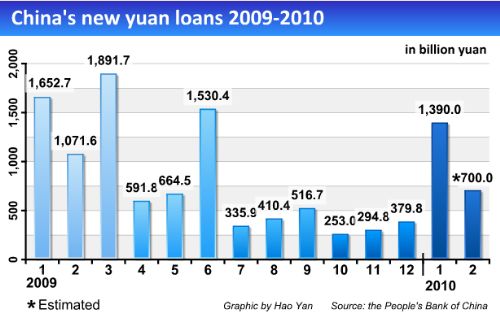Top Biz News
New Feb lending 'to reach' 700b yuan
By Wang Bo (China Daily)
Updated: 2010-02-27 09:00
 |
Large Medium Small |
Slowdown due to govt calls to cool booming economic growth
Chinese banks may have issued some 700 billion yuan ($102.54 billion) in new loans in February, a major slowdown from January, due to repeated government calls to rein in lending to cool down the booming economy, analysts said.
New loans reached almost 600 billion yuan before Feb 13 - the start of the week-long Lunar New Year holiday, so the amount may eventually exceed 700 billion yuan by the end of the month, Shanghai Securities Journal reported on Friday citing industry sources.

"There is no doubt that the February figure will be significantly lower than the previous month, as the authorities have been pushing commercial lenders to contain lending to head off inflation and possible default risks," said Chen Xi, a Shenzhen-based banking analyst with First Capital Securities.
"The seven-day Spring Festival vacation falling in the month also affected demand for credit," she said.
Following the record credit expansion last year, Chinese banks rushed to advance a total of 1.39 trillion yuan in new loans in January this year, prompting the regulator to take measures to control the explosive lending growth that had sparked concerns about the rising risk of asset bubbles and bad loans.
The nation's financial regulator has required banks to lend no more than 30 percent of the annual loan target of 7.5 trillion yuan in the first quarter of this year.
"Half of the quota share was used up by the lenders in January, which means they have limited lending room for the rest of the first quarter," Chen said.
Brisk lending at the beginning of the year has drawn the attention of Chinese policymakers. The central bank raised bank reserve requirements, or the share of deposits banks must hold as reserves, by 0.5 percent this month, the second increase this year, in a move to curb credit growth and stem inflation risks.
Besides, the banking regulator is also mulling lifting its capital adequacy ratio requirement for large State-owned banks from 11 to 11.5 percent, the 21st Century Business Herald reported on Friday. Analysts said the move is aimed to limit banks' business expansion and help them to cope with possible defaults.













